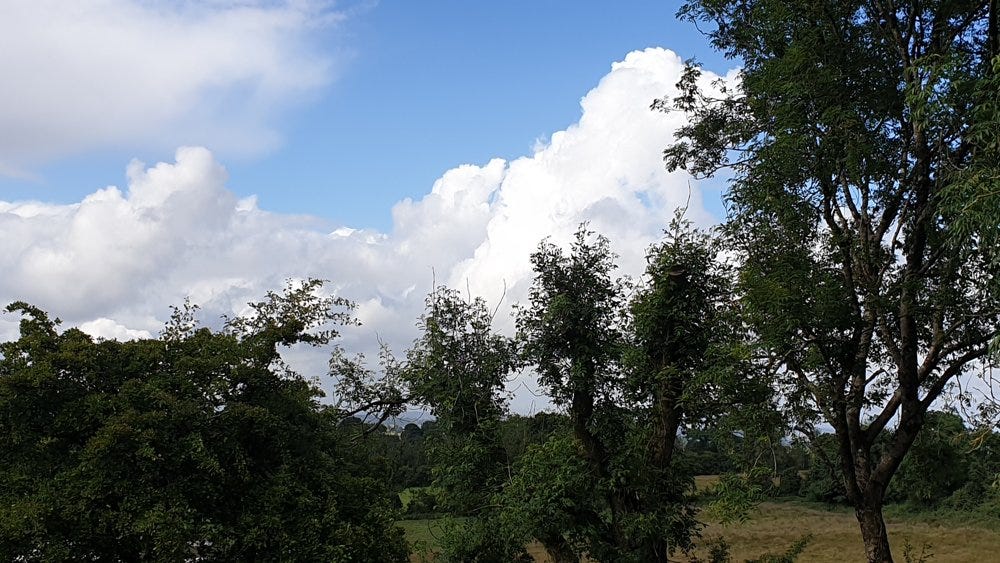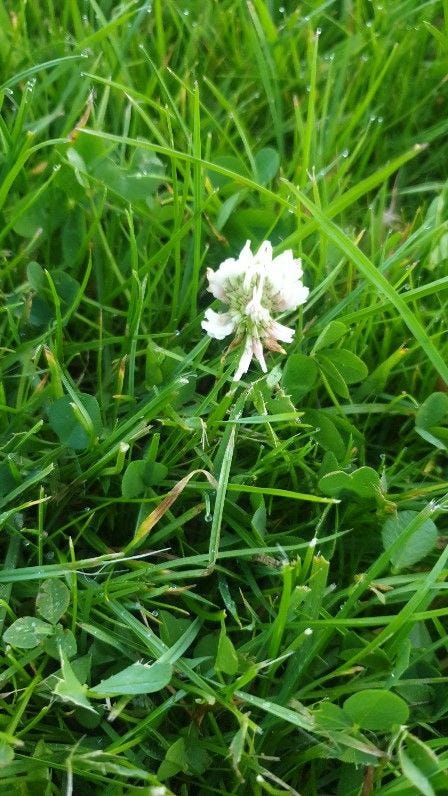Happy Friday!
And welcome to edition 328.
👋 My name is David and I’m a writer, outdoor instructor and cyclist-at-large with Thighs of Steel. I write stories that help you and me understand the world (and ourselves) a little better.
If, like the Kodak company until 1989, you’re running your life by the 13-month International Fixed Calendar, then today isn’t a Friday at all — it’s Saturday 14 Sol — so apologies for the late running of this newsletter.
If, on the other hand, you’re on the Gregorian Calendar, then — Happy Friday! — we’re now halfway through the year.
Nature Loves A Broccoli
I've written about fractal patterns in nature before, about how restorative they are, and just how damn cute.
The branching of a tree, for example, is a pattern repeated at every level, from the veins of its leaves to the mycorrhizal networks of the fungi among its roots.
But my mind was pleasantly massaged earlier this week by the framing of an image laid out before me at the top of a hill overlooking the Somerset Mendips.
The foreground of my vision was a broccoli of grasses and clover, echoed above, and at a distance such that the pattern was repeated almost identically, by a broccoli perspective of deciduous woodland and hedgerow.
Occupying the entire upper half of the masterpiece, like proud sketches of the whole, the Platonic form of nature’s eternal pattern, were the magnificent broccoli towers of cumulus clouds.
Nature loves a broccoli. I see you. I see you. I see you.
The Dwelling Place Of Our Soul
I’m writing this from the final day of a three-day introductory course in ecopsychology, led by Natural Academy.
That wiggly red underlining indicates that my computer doesn’t recognise ecopsychology as a word, so let’s break it down.
Eco- comes from the Greek oikos, meaning home or dwelling place — and, by extension, the household or family.
psych- comes from the Greek psyche, meaning spirit, mind or soul.
-ology comes from the Greek logos, meaning discourse, speech or reason — or, if you’re a Stoic, ‘the divine animating principle pervading the Universe’.
Ecopsychology is, then, a discourse on the dwelling place of our soul. Or perhaps conversations around the soul of our dwelling place. Or perhaps the two are identical.
Dwelling Place
Natural Academy prefer to use the term dwelling place over home, not only because dwelling place rolls more deliciously around the mouth, but because home is such a loaded term — for all of us, not least those ousted from or without their own.
Every being, however, must dwell in a place — even if only for this moment now.
Fascinatingly, the origins of the word dwell are more sinister, from the Sanskrit to mislead or disceive.
Perhaps there’s still something of the misleading in the word, that, for many of us, our dwelling place seems deceptively permanent or stable.
In reality, our dwelling is temporary, we’re transient visitors, fleeting expressions of consciousness.
Dwell has a broader, less partizan pattern of meaning, compared to the concept of home, for we can also dwell on an emotion or a thought, lingering, giving over our attention to fix on something important — or unimportant.
But mainly it’s just a lovely word.
Dwell.
The Return
So that's what ecopsychology is — a conversation around the dwelling place of our soul.
A reintegration of psychology and ecology: an acceptance that we are nature.
Despite being pretty cosmic in scope, ecopsycholgy couldn't be simpler. It's nothing more than a return: coming back to ourselves as nature.
Over the course of the past three days, I noticed this in myself. Less learning and more remembering.
Like, I know what these white flowers pockering the grass are —
But it takes a smartphone app to tell me what I already know.
I wasn’t alone in this sense of remembering, for there is nothing in our natures that is alien to nature.
Yet, sometimes our disconnection is such that we need a bit of help getting back there, reconnecting, rediscovering the lines of reciprocity that fly between each node of nature's unique, bountiful, abundant expression.
To see the lines that connect us with the beech bobbing outside the windows we peer through from inside our dwelling place, from inside our skull. The we that reaches out and connects with the touch of bark that reaches out from a branch of beech.
I'm here to learn how to facilitate these reconnections.
Facilitator
Facilitator is another word that's interesting to explore etymologically.
Facere is Latin for doing or making, thus facilis: easy to do, from where we get the word facile.
A facilitator, then, is someone who makes the doing or making easy for someone else.
As a facilitator of nature connectedness, my job is to make reconnection with nature easy for others. This is a simple task because, of course, a facilitator is not a teacher.
Nature does the work.
All we have to do is clear that path back to nature, hold out a steadying arm, make the going easy.
Bring people back.
Encourage them to dwell for a moment on their dwelling place, on the environment around them in this moment, and to explore what that place is reflecting back to them about this connection we call soul.
And, above all, to invite them into the conversation.
So I invite you to engage directly with your dwelling place, your here and now, and to take two minutes to peer into its corners, scratch and sniff its edges, and expand your appreciation for its wholeness — and, naturally, your part within that wholeness.
Suspend any notions of beauty or judgement and instead wonder what the unique wholeness of your dwelling place could be trying to tell you about your soul’s place and purpose.
Like I said: cosmic.
100 Days of Adventure
🟢🟢🟢🟢🟢🟢🟢🟢🟢🟢🟢🟢🟢🟢🟢🟢🟢🟢🟢🟢🟢🟢🟢🟢🟢🟢🟢🟢🟢🟢🟢🟢🟢🟢🟢🟢🟢🟢🟢🟢🟢🟢🟢🟢🟢🟢🟢🟢🟢🟢🟢🟢🟢🟢🟢🟢🟢🟢⚪⚪⚪⚪⚪⚪⚪⚪⚪⚪⚪⚪⚪⚪⚪⚪⚪⚪⚪⚪⚪⚪⚪⚪⚪⚪⚪⚪⚪⚪⚪⚪⚪⚪⚪⚪⚪⚪⚪⚪⚪⚪
That Podcast Link Again…
Almost as soon as I posted it, Spotify mystifyingly changed the link to my conversation with Saoirse at Bikepacking Buds, a rad community that aims to create a network of bikepackers across the UK.
Listen on Spotify and hear all about cycling Britain on a £50 auction bike, riding to Athens four times, how to fix broken brakes with duct tape, doing laps of Dartmoor for the sake of GPS artwork, and, of course, the spirit badger origin of my touring bugle.
Three Small Things At The End
WEED: How many times have I trampled this pretty little weed, not knowing that I had beneath my feet the sweet sharp scent of pineapple?
POEM: ‘Hope’ is the thing with feathers that perches in the soul
DIVERSITY: Three species previously unknown to science found in packet of shop-bought porcini
Big love,
dc:






Really enjoyed that summary of those three days! Thank you